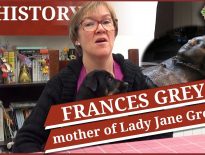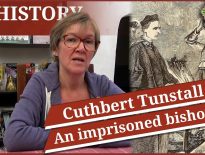On this day in Tudor history, 19th November 1587, Henry Vaux died of what was probably consumption at Great Ashby, the home of his sister, Eleanor Brooksby.
Henry Vaux is a fascinating Tudor man. He started out as a precocious child and poet, and grew up to be an important member of the Catholic underground. He was a Catholic recusant and priest harbourer, helping Jesuit priests in the Protestant reign of Queen Elizabeth I, both financially and by giving them a roof over the heads.
In today's talk, I introduce Henry Vaux and what happened to him in Queen Elizabeth I's reign.
Book Recommendation: One of my very favourite history books is "God's Traitors: Terror and Faith in Elizabethan England" by Jessie Childs.
Also on this day in history:
- 1563 - Robert Sidney, 1st Earl of Leicester, courtier, patron of the arts and poet, was born at Penshurst in Kent.
- 1564 – Death of Lord John Grey, youngest son of Thomas Grey, 2nd Marquis of Dorset and courtier. Grey was arrested with his brothers, Thomas and Henry (Duke of Suffolk and father of Lady Jane Grey), in 1554 for their involvement in Wyatt's Rebellion. Thomas and Henry were executed, and although John was condemned to death, he was released and pardoned due to the intercession of his wife, Mary, sister of Anthony Browne, Viscount Montagu.
- 1566 – Death of Reynold Corbet, member of Parliament and judge. He was buried at Stoke upon Tern in Shropshire. Corbet's offices included recorder of Shrewsbury, Justice of the Peace for Shropshire, a member of the Council in the Marches and Puisne Justice of the Queen's Bench.
- 1584 – Death of William Bendlowes, member of Parliament, Serjeant-at-Law and Law Reporter. He was buried at Great Bardfield in Essex, where his monumental brass can still be seen today. Bendlowes reported on court cases from the period 1534-1579.
- 1590 – Death of Thomas Godwin, physician and Bishop of Bath and Wells, at Wokingham in Berkshire, his birthplace. He had retired there due to ill health, and was buried in the local church. Elizabeth I chose Godwin as one of her Lent preachers, and he served in that post for eighteen years.
- 1604 – Death of Richard Edes, Dean of Worcester, royal chaplain and court preacher, at Worcester.
If you're interested in Henry Vaux and Catholic recusants in Elizabeth I's reign, then you should find this talk by historian Jessie Childs of interest:
And today is also the anniversary of the birth of Robert Sidney, 1st Earl of Leicester, courtier, patron of the arts and poet, at Penshurst in Kent. Here is a talk I did on Robert Sidney to commemorate his death:



Oh, cool, thanks for sharing the video of Jesse Childs, I’m looking forward to watching! Another interesting family! Michelle t
Have you read her book? God’s Traitors is fantastic, such a good read.
No, but it’s on my list now. I had a chance to watch the video of her talk later in the day yesterday, it was very interesting! Thanks for including it.
Anne Vaux was a big player in the underground, finding safe houses and helping a number of Catholic priests in her time. She was imprisoned and came under suspicion herself under Elizabeth and James and of course is famous for her connection to the Gunpowder Plot, although not as a plotter but someone whose heroism helped save lives and who tried to hide others who were accused.
Yes, Anne was a huge part of the underground and although Gunpowder did take some liberties, it was wonderful at bringing attention to her role.